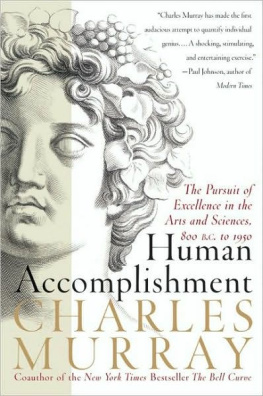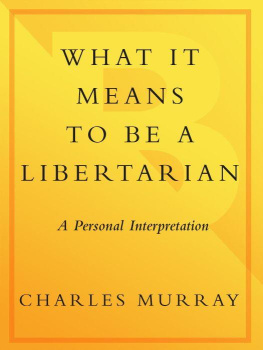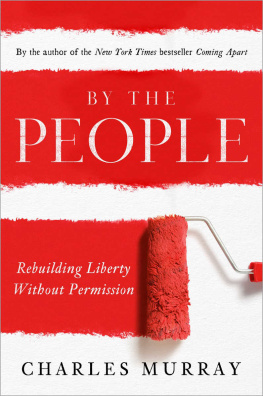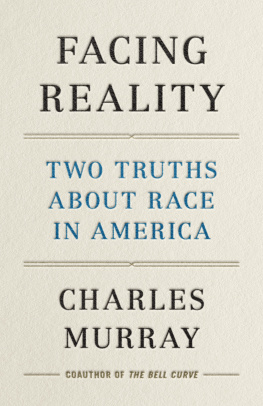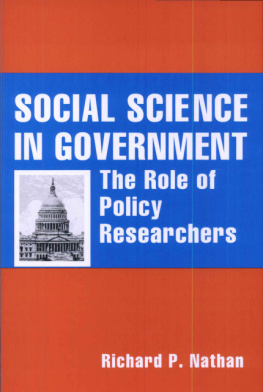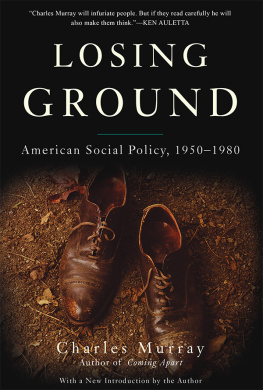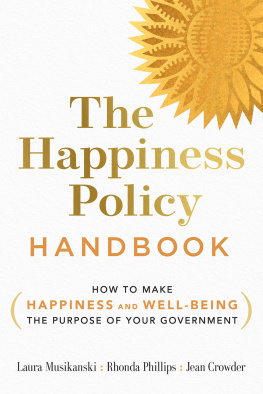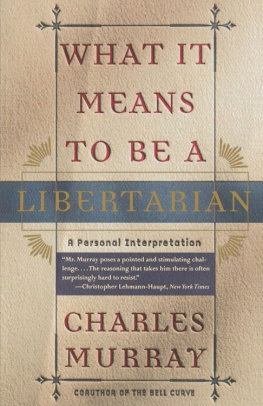[print edition page i]
In Pursuit: Of Happiness and Good Government
[print edition page ii]
[print edition page iii]
In Pursuit: Of Happiness and Good Government
Charles Murray

[print edition page iv]
This book is published by Liberty Fund, Inc., a foundation established to encourage study of the ideal of a society of free and responsible individuals.

The cuneiform inscription that serves as our logo and as a design element in Liberty Fund books is the earliest-known written appearance of the word freedom (amagi), or liberty. It is taken from a clay document written about 2300 B.C. in the Sumerian city-state of Lagash.
This 2013 Liberty Fund edition is reproduced from the edition published by Touchstone, a division of Simon & Schuster, 1988.
1988 by Cox and Murray, Inc. Reprinted by permission of Charles Murray.
This eBook edition published in 2013.
eBook ISBNs:
Kindle 978-1-61487-632-8
E-PUB 978-1-61487-259-7
www.libertyfund.org
[print edition page v]
To Catherine
This book especially
[print edition page vi]
[print edition page vii]
Contents
[print edition page viii]
[print edition page ix]
The roots of this book go down twenty years. It was the spring of 1968 in Thailand, an insurgency was in progress in the northeastern part of the country, and the Thai and American governments were pouring resources into rural developmentthe Thai version of winning the hearts and minds of the people. Fresh out of the Peace Corps, I was leading the fieldwork for a case study of four villages. We wanted to interview villagers about the development projects in their communities and, more generally, about what they thought of the Thai officials in their district. We wouldnt try to force the villagers responses into multiple-choice boxes; rather, we would just let them talk and then we would write down what they said, however they chose to say it.
After a few weeks in our first set of two villages, I was convinced the research was going to be a failure. The interviews were turning up only the most casual mentions of either the development projects or government officials. We werent going to have enough data to analyze. So the Thai interviewers and I tried a variety of fixes. None worked. We were confident that the villagers were being candid with us, but probe as we might, the conversation kept veering away from the topics that were important to us. Instead, the villagers talked at length about the affairs of the village. Sometimes it was about the family next door, the price of kenaf, or the new bus service into the market town. Often it was about governancenot the governance of the nation or of the district, however, but governance of the village.
The accounts that unfolded were far different from the ones I had expected. For while my two years in the Peace Corps had taken me to many villages, I had always approached them as a change agent, as that role was called in those days. We change agents had been enjoined to consider the needs of the people and encourage local participation, much as change agents back in the States were calling for maximum feasible participation in community development
[print edition page x]
projects. But my experience had been that villagers seemed never to get anything done. Give a project to the village, and it would bog down. Now, with the chance to sit back and just listen, I was hearing about all the things that village headmen and committees (their committees, home-grown) did when the change agents werent around. They ranged from major projects like building a reservoir to day-to-day functions like reconciling marital disputes. Sometimes the mechanisms were sophisticated: progressive taxation to finance repairs to a village hall, renting a grader to make a road, designating one villager to go away to learn brickmaking so he could teach the others. Sometimes the mechanisms were simple. Not everything was always done well. In one of the two villages, the main topic of conversation was how to remove an incompetent headman. But good or bad, the governance of the villages affairs was at the center of interest.
As the interviews accumulated, I had to face the fact that the villagers concerns were anchored in things that we werent asking questions about. Then another thought hit me: They were right. The conditions that made for a happy or unhappy village had much more to do with the things they were interested in than with the things I was interested in.
My small epiphany had nothing to do with theories of social change, just the simple truth that Alexis de Tocqueville had in mind when he began his examination of American political institutions, one hemisphere and more than a century removed. It is not by chance that I consider the township first, he wrote in Democracy in America:
The township is the only association so well rooted in nature that wherever men assemble it forms itself. Communal society therefore exists among all peoples, whatever be their customs and laws. Man creates kingdoms and republics, but townships seem to spring directly from the hand of God.
Had I read Tocqueville more thoroughly in my college days and remembered it better, I would have seen much more quickly how the villages worked and how effective development in them came about:
It is in the township, the center of the ordinary business of life, that the desire for esteem [and] the pursuit of substantial interests...
[print edition page xi]
are concentrated; these passions, so often troublesome elements in society, take on a different character when exercised so close to home and, in a sense, within the family circle.... Daily duties performed or rights exercised keep municipal life constantly alive. There is a continual gentle political activity which keeps society on the move without turmoil.
But it did not occur to me to consult my foggy memories of Tocqueville in trying to understand what I was observing. These were Thai villages in 1968, not New England townships in 1831.
The half-formed thoughts that came to me during the early stages of the research were brought more sharply into focus as the research proceeded. One of the next two villages we chose was a model village, the pride of the Mukdahan District. An energetic and engaging young Thai official had been imported into the community and had brought about a cascade of development projectsa fishpond, a new school building, a cotton-growing project, a rice cooperative, even a health clinic. This time, we were sure we would get material about our assigned topic, for in this village the official Thai government was very much a part of current village life.
We first occupied ourselves with trying to find how each individual project had affected the village. (Were there fish in the fishpond? How many people used the health clinic? How had these projects affected the villagers lives?) Again, we ran into a problem. The villagers answers about the effects of any individual project were short. But their discussions of the ways in which the life of the village had changed overall were spontaneous and subtle and deeply feltand the news was not good. The energetic and engaging young official had taken over (with the best interests of the villagers at heart), and in so doing had supplanted the mechanisms by which the villagers ran their village and pursued their lives. The villagers said plainly and without qualification that the life in this model village had gotten worse, not better.
Next page

